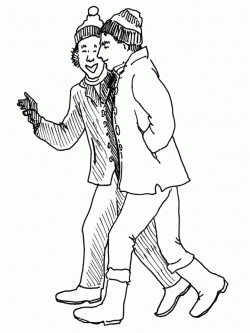Hand signals: Without gestures, talk is hard
Q. Two friends walked along on a bitterly cold winter day, one chattering away while the other just nodded. Eventually, the first asked, "Robert, why aren't you saying anything?" Can you guess his handy response? –H. Keller
A. "Because I forgot my gloves."
When gesture researcher Robert Krauss heard this, he understood well Robert's reasoning: when gesturing is limited or difficult, communication itself becomes limited and difficult.
We are a species that talks with our hands, says David G. Myers in Psychology. To underscore the importance of gesturing, researchers point out that people spontaneously gesture even when talking on the phone, and that when people are told not to gesture, they have to put more effort into communicating through speech alone.
Further, researchers note that signed language readily develops among deaf people and among congenitally blind people gesture (even when they believe their listener is also blind).
Q. What sorts of wildlife film "fakery" might be coming to a TV screen near you? –L. DiCaprio
A. More than most people suspect, says wildlife program producer Chris Palmer in New Scientist magazine. For instance, the IMAX film Wolves pictured them roaming freely across the landscape.
"In reality, we rented the wolves from a Montana game farm and released them from cages just before we shot each scene. Although a warning was included in the credits, probably few people saw it. A lot of the supposedly wild animals you see on TV live in game farms, which charge photographers over $5,000 to take an animal to a local beauty spot."
A classic stunt is hiding jelly beans in carcasses. If a film shows a bear feeding on a dead elk, probably the bear was hired from a game farm and is looking for sweet treats hidden by the film-makers. Actually, it's virtually impossible to make a wildlife film without some fabrication, says Palmer. Such "staging of natural events" is a shortcut to otherwise inaccessible or expensive footage.
One BBC documentary on polar bears supposedly showed a mother bear
giving birth in the wild, but later the producers admitted the scene was shot in a zoo. Also, the sounds in most wildlife films are added in post-production, since it would be too risky to get that close to animals in the wild.
As Palmer sees it, such animal fakery can be justified only if the film has a strong conservation message.
Q. Dear reader, would you say you're a nice person? How about your parents and grandparents, ancestors living hundreds of years ago? So the question really becomes, "nice" in which historical sense? –E. Post
A. Back in Chaucer's time, someone "nice" was a foolish fellow, explains Anu Garg in The Dord, the Diglot, and an Avocado or Two. Along the way to today, the word has taken on so many senses as to span almost the entire human spectrum: foolish, simple, dissolute, extravagant, scrupulous, elegant, fastidious, refined, respectable, fainthearted, lazy, fragile, pampered, strange, shy, intricate, exact, slender, trivial, dexterous, attractive, and currently, pleasant and agreeable.
"With so many senses, we could describe every one of the 6+ billion people
on this Earth," Garg says. "Who needs another word?"
It all started with the Latin "ne-" (not) + "scire" (to know). Someone nice was ignorant. In Spanish, "necio" still means "foolish" or "fool." That same Latin root also gave us science, prescient, plebiscite, conscious and conscience.
So, it's a nice time in history to be called "nice"!
~
Send Strange questions to brothers Bill and Rich at [email protected]
